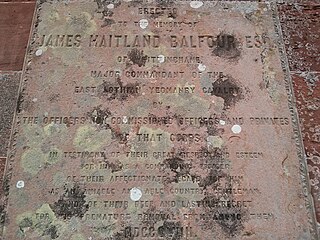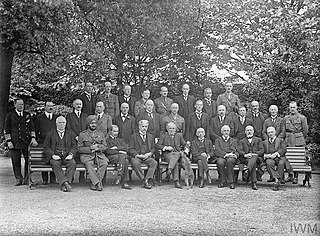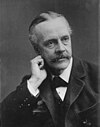Related Research Articles

Arthur James Balfour, 1st Earl of Balfour,, also known as Lord Balfour, was a British Conservative statesman who served as Prime Minister of the United Kingdom from 1902 to 1905. As foreign secretary in the Lloyd George ministry, he issued the Balfour Declaration of 1917 on behalf of the cabinet, which supported a "home for the Jewish people" in Palestine.
The Plumian chair of Astronomy and Experimental Philosophy is one of the major professorships in Astronomy at Cambridge University, alongside the Lowndean Professorship. The chair is currently held at the Institute of Astronomy in the University. The Plumian chair was founded in 1704 by Thomas Plume, a member of Christ's and Archdeacon of Rochester, to "erect an Observatory and to maintain a studious and learned Professor of Astronomy and Experimental Philosophy, and to buy him and his successors utensils and instruments quadrants telescopes etc."
Regius Professorship of History is one of the senior chairs in history at the University of Cambridge. It was founded in 1724 by George I as the Regius Professorship of Modern History.
The Slade Professorship of Fine Art is the oldest professorship of art and art history at the universities of Cambridge, Oxford and University College, London.
The Serena Professorship of Italian is the senior professorship in the study of Italian language, literature and culture at the University of Cambridge, University of Oxford, University of Manchester and University of Birmingham. At Cambridge, it was founded in 1917 by a donation of £10,000 from Arthur Serena, a shipbroker and son of the Venetian patriot Leone Serena. He also endowed the Serena Medal awarded annually by the British Academy for furtherance of the study of Italian history, philosophy, music, literature, art and economics.

Reginald Baliol Brett, 2nd Viscount Esher, was an historian and Liberal politician in the United Kingdom, although his greatest influence over military and foreign affairs was as a courtier, member of public committees and behind-the-scenes "fixer", or rather éminence grise.

James Maitland Balfour was a Scottish land-owner and businessman. He made a fortune in the 19th-century railway boom, and inherited a significant portion of his father's great wealth.

Liberal David Lloyd George formed a coalition government in the United Kingdom in December 1916, and was appointed Prime Minister of the United Kingdom by King George V. It replaced the earlier wartime coalition under H. H. Asquith, which had been held responsible for losses during the Great War. Those Liberals who continued to support Asquith served as the Official Opposition. The government continued in power after the end of the war in 1918, though Lloyd George was increasingly reliant on the Conservatives for support. After several scandals including allegations of the sale of honours, the Conservatives withdrew their support after a meeting at the Carlton Club in 1922, and Bonar Law formed a government.

Reginald Crundall Punnett FRS was a British geneticist who co-founded, with William Bateson, the Journal of Genetics in 1910. Punnett is probably best remembered today as the creator of the Punnett square, a tool still used by biologists to predict the probability of possible genotypes of offspring. His Mendelism (1905) is sometimes said to have been the first textbook on genetics; it was probably the first popular science book to introduce genetics to the public.

Arthur Woollgar Verrall was a British classics scholar associated with Trinity College, Cambridge, and the first occupant of the King Edward VII Chair of English. He was noted for his translations and for his challenging, unorthodox interpretations of the Greek dramatists, such as his commentary on Agamemnon; his detractors found his readings contorted and too ingenious, too often overlooking obvious explanations in favour of the convoluted, and his published work is nowadays not highly regarded. After his death, admirers M. A. Bayfield and J. D. Duff edited Verrall's Collected Literary Essays. Classical and Modern and Collected Essays in Greek and Latin Scholarship 1914. Among his publications, Euripides the Rationalist was highly influential. He was a member of the Cambridge Apostles, a secret society, from 1871.
The Committee of Imperial Defence was an important ad hoc part of the Government of the United Kingdom and the British Empire from just after the Second Boer War until the start of the Second World War. It was responsible for research, and some co-ordination, on issues of military strategy.

The leader of the Conservative Party is the highest position within the United Kingdom's Conservative Party. The current holder of the position is Rishi Sunak, who was elected to the position on 24 October, following his unopposed victory in the party's leadership election.

Gerald William Balfour, 2nd Earl of Balfour, PC, known as Gerald Balfour or The Rt Hon. G. W. Balfour until 1930, was a senior British Conservative politician who became a peer on the death of his brother, former prime minister Arthur Balfour, in 1930.

Hugh Oakeley Arnold-Forster PC, known as H. O. Arnold-Forster, was a British politician and writer. He notably served as Secretary of State for War from 1903 in Balfour's Conservative government until December 1905.

The Liberal government of the United Kingdom of Great Britain and Ireland that began in 1905 and ended in 1915 consisted of two ministries: the first led by Henry Campbell-Bannerman and the final three by H. H. Asquith.
Lieutenant-Colonel Francis Cecil Campbell Balfour was a British military officer and colonial administrator.

Colonel Eustace James Anthony Balfour was a London-based Scottish architect. The brother of one British Prime Minister and nephew of another, his career was built on family connections. His mother was the daughter of a Marquess, and his wife Frances, a noted suffragist, was the daughter of a Duke. Frances's sister in-law was Princess Louise, daughter of the reigning Queen Victoria.
Alice Blanche Balfour was a Scottish entomologist, naturalist, scientific illustrator and one of the earliest pioneers in the science of genetics.
The Department of Genetics is a department of the University of Cambridge that conducts research and teaching in genetics.
The 1916 Prime Minister's Resignation Honours were awards announced on 22 December 1916 to mark the exit of Prime Minister H. H. Asquith, who resigned in early December.
References
- ↑ "History of the University of Cambridge Department of Genetics". gen.cam.ac.uk. Archived from the original on 2013-10-30. Retrieved 2015-08-03.
